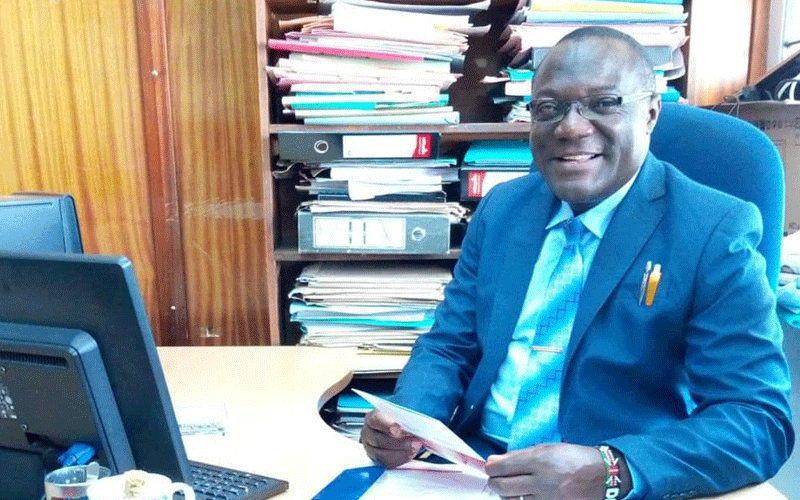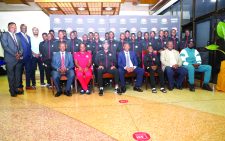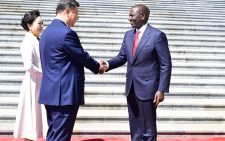Kakamega sponsored students grounded over funds crunch

In February this year, a group of 12 top Kenyan students studying human medicine and engineering in China’s Shanghai University of Science and Technology (USST) fled the country as the coronavirus ravaged China and evolved into a global pandemic.
The students, on full scholarship by the Kakamega county government in conjunction with the Chinese government took the 18-hour flight to their home country, a place they considered a safe haven from the ongoing contagion.
They felt relieved, after all, this was also a justified opportunity to once again meet their families and friends after months away in a foreign country.
And although coronavirus is still a global menace a year down the line, studies at their university have resumed throwing the students into a limbo. They are now stuck at home, despair fast replacing their dreams.
Reagan Wafula, 21, is one such student. An orphan from Namakoye village in Navakholo sub-county is unable to raise the air ticket to travel back to Shanghai to attend classes and does not have the resources to enable him take part in virtual classes, which started in May.
His attempt to swap from Shanghai back to a local university in the country has hit a snag considering that the move will attract a heavy financial cost.
He already lost his chance for tuition support by the Kenya Universities and Colleges Central Placement Service (KUCCPS) when he got the sponsorship and he can now only be enrolled as a private student.
“When I settled for China, I was clueless about what it entailed. Sometimes I think that the delight and excitement of flying abroad probably blighted my focus. I now realise it was a terrible gamble.
I’m unable to go back to China, neither do I have access to online learning, because it is expensive as well,” Reagan, who is torn between fending for his poor family and buying daily data bundles told Scholar.
Defer studies
Babra Obayi, who was a top girl in Kakamega county in 2016 Kenya Certificate of Secondary Education was sent to China by the county government to study civil engineering in 2017.
She too, arrived in Matete village, Lugari sub-county in February as Covid-19 was breaking ground and just like Wafula, she remains stranded in her village long after her university re-opened in September.
She is however, lucky her parents can afford to cater for the cost of her online classes.
In Khwisero sub-county, the story is the same as another bright student Wisdom Furaha, is drifting into despair.
Wisdom, an alumnus of Booker Academy is studying medical imaging technology at USST, but has been forced to defer his studies for lack of an air ticket to travel to back to school.
While it might appear as good news for Danstone Isundu, another top student in Kakamega county in the 2015 KCSE class, who was lucky to have travelled back to China in time before a ban on international travel to China in September, all is not well.
A fourth-year electrical engineering student at USST, Isundu told Scholar in a phone interview that his Kakamega colleagues have been forced to defer their studies or forego the scholarship altogether due to unresolved academic issues.
“Air tickets are just one of the critical issues we wanted addressed. I paid for my air fare back,” he said.
Asked about the nature of the scholarship, Isindu who is a student leader for the Kenyan students said it is a half scholarship.
“Kakamega government pays for our stay and stipends while the Shanghai Municipal government accounts for tuition fees and medical insurance,” he explained.
Kakamega County Executive Committee (CEC) member for education George Lutomia said he was aware 12 students had not reported back to Shanghai, but insisted the county is in no position to help.
He said the county will not pay for the students’ travel back to China as the administration was not involved in their travel back to Kenya.
He also said the county has no budget to support virtual classes for stranded students.
The county has placed 48 students on the scholarship programme in the past four years among them 25 students, who are in China while 23 are supported in local universities.
The 2020 cahoot has 13 students expected to join the programme raising the number to 61.
The scholarship programme had an annual budget of Sh20 million, which was raised to Sh25 million this year.
Dr Lutomia declined to say how much is spent on each foreign student and those in local universities, “I don’t want to take that route,” he quipped.
The last time the county treasury wired funds towards the course was in November last year.
Three months after the start of the new academic year, Dr Lutomia admits no cash has left treasury to support students in China or local universities.
“They are okay… we shall send them the allowances when things stabilise,” he said adding that there is no cause for alarm.
He attributed the delayed release of funds to the institutions to the revenue sharing formula stand-off that pitted the senate and national treasury.
The county assembly education committee chairman Charles Imbali read mischief in the entire programme arguing it was not practical for treasury to blame revenue stalemate for delayed disbursement of funds to students noting scholarship budget from the 2019/20 was not exhausted.
National government probe
Meanwhile, the government of Kenya has stopped payments as a probe on the Kakamega county education scholarship scheme gets underway following an arrest of a Kenyan student by Chinese authorities over alleged e-fraud in February.
Dr Lutomia has confirmed the probe saying it would further delay disbursement of accommodation and living allowances to students in China.
The county was also instructed to furnish the national treasury with exam transcripts for all students on scholarship in China last month.
The transcripts issue follows a long list of concerns rocking the county education scholarship scheme among them questions on whether it’s a full or half scholarship and why Kenyan students are taught engineering or medicine in Chinese language.
Dr Lutomia, however, said transcripts are a requirement by the treasury to allow transfer of funds to the students, but dismisses concerns about the students being taught in Chinese , terming it as a petty issue.
“What evidence do you have that students failed because of language? Do you know it’s criminal to publish results of the exam transcripts?” he challenged.
Sponsored students have gone without county support for the past 11 months after Covid-19 pandemic disrupted government revenue streams coupled with a prolonged county revenue sharing stand-off between the senate and national treasury that ended in September.
Parents and students in separate interviews hold a contrary view and attribute the decision to concerns raised about the quality of the training USST and lack of internship opportunities in China.
The students pointed to a fact finding mission conducted at their university last year by the county education chief officer Irene Ashioya after they complained about the ‘Chinese syllabus.’
Ashioya confirmed the visit and the ‘unfamiliar language’ which made learning rigid and cumbersome.
“We also discovered that content for engineering studies at undergraduate level is of lower quality compared to Kenya and this was an oversight for those who signed the deal,” she said.
She, however, could not sufficiently answer whether guarantees exist for the degrees to get approvals from Kenya professional bodies such as the Engineers Board of Kenya or Medical Practitioners and Dentists Board.
Former dean of the medical school at Masinde Muliro University of Science and Technology (MMUST) Prof Charles Chunge said the scholarship deal was skewed in favour of the Chinese university.
“About 60 per cent of medical language is Latin. So if 40 per cent is Chinese for a Kenyan student, there will be trouble.” he quipped adding, “The county government went for cheap ‘local university’ instead of the costly international universities.
There are about 40 of them in China and students are free to choose the language medium of study.” Another university don Prof Makhanu Sibilike says it is not late to return the students on the right trajectory.
“Chinese language should just be a medium of interaction for the students, but they risk failing if they are taught using the language,” said the career civil engineer and former Vice-chancellor of MMUST.












